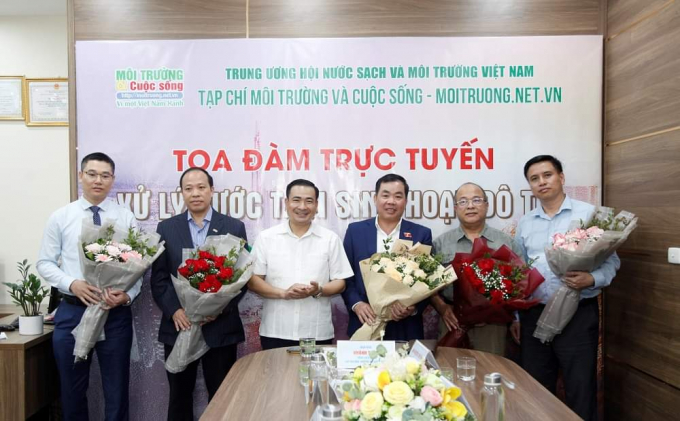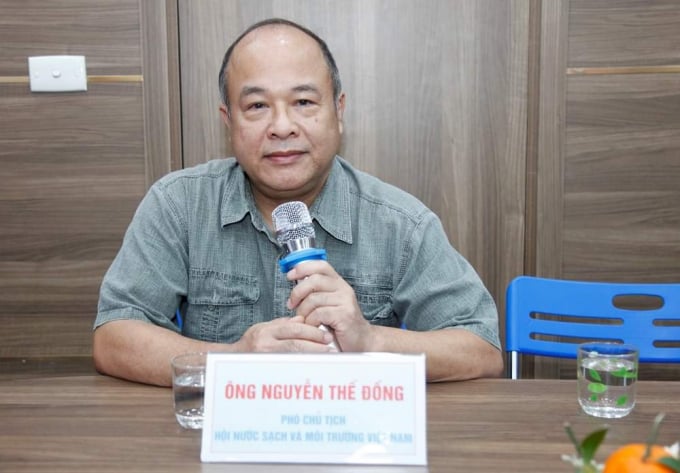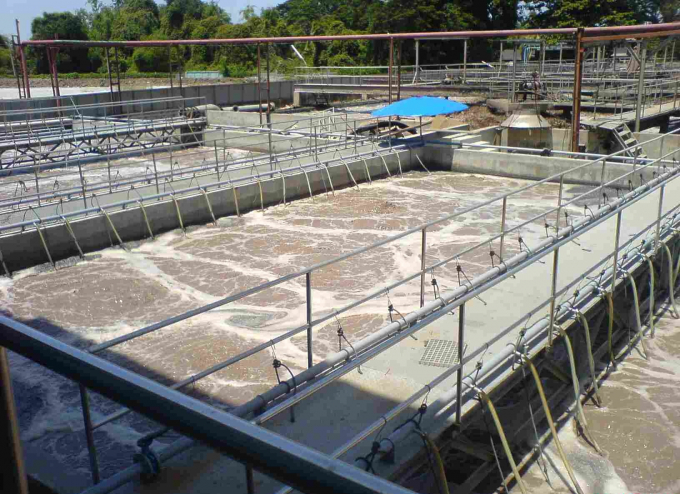November 25, 2025 | 15:33 GMT +7
November 25, 2025 | 15:33 GMT +7
Hotline: 0913.378.918
November 25, 2025 | 15:33 GMT +7
Hotline: 0913.378.918

Overview of the talk on April 12.
On the afternoon of April 12, at the Seminar on "Treatment of urban domestic wastewater", Mr. Nguyen The Dong - Vice Chairman of Viet Nam Association For Safe water and Environmental Sanitation, Mr. Nguyen The Dong, former Deputy Director of the General Department of Environment commented, with the current wastewater treatment infrastructure system, Vietnam needs about 20 billion USD to solve the problem of wastewater, especially domestic wastewater in urban areas.
The 20 billion USD figure was also mentioned by the Asian Development Bank (ADB) when advising the Government of Vietnam, to achieve the goal of connecting about 35 million urban population to the concentrated wastewater collection and treatment system by 2025
ADB's calculation is based on the per capita cost of connecting to a new wastewater system that ranges from $200-600. This is a large number, especially given that many wastewater treatment companies are not sufficiently prepared to operate on a commercial basis and attract capital as well as technical expertise from the private sector.
This issue was confirmed by Mr Dong. The expert listed 4 more reasons, explaining the investment capital of up to 20 billion USD in the near future.
Firstly, the wastewater treatment infrastructure is facing many difficulties and inadequacies, unable to keep up with the process of urbanization and industrialization.
Secondly, the lack of responsibility in a large number of businesses and organizations in urban areas, many of which violate regulations on environmental protection.
Thirdly, the planning of water supply and drainage in provinces and cities has many shortcomings, so the wastewater treatment process for businesses faces many challenges and difficulties.
Fourthly, the lack of mechanism to attract and encourage investment leaves the wastewater treatment market almost untapped. It is difficult for investors to deploy their business and get the desired effect.

Mr. Nguyen The Dong, former Deputy Director of the General Department of Environment.
Discussing about the issue, National Assembly member Nguyen Quang Huan - Member of the Science, Technology and Environment Committee under the National Assembly, Vice Chairman of the Vietnam Association for Safe Water and Environmental Sanitation - said that about 80- 90% of wastewater is being discharged directly into the environment.
"Our country's wastewater treatment capacity is currently very low. If this continues, in 20-30 years, our children and grandchildren will not have clean water to use," said Mr. Huan.
Another difficulty in the process of improving the urban domestic wastewater treatment capacity is that most wastewater treatment systems are currently grouped together, while to achieve optimal efficiency, we need to separate them into two parallel systems.
"The formation of industrial parks is rapid, so construction density increases. This causes older pipelines to be overloaded," said Mr. Luong Ngoc Khanh - Head of Department of Drainage Management, Department of Technical Infrastructure (Ministry of Construction) added.
As a member of Binh Duong Provincial National Assembly, Mr. Nguyen Quang Huan addressed the local solution, which is calling for early investment; proactive and flexible in smart city building policies, focusing on building a transparent information database on the local environmental situation.
From this point of view, Mr. Huan raised the solution of digital transformation as a fundamental approach to treat wastewater.

About 80-90% of wastewater in Vietnam is being discharged directly into the environment.
In another locality with many industrial zones - Bac Ninh province - Mr. Nguyen Van Hoan, Deputy Director of the Department of Construction emphasized the role of planning. He said that there should be a dedicated land for wastewater treatment, and additionally, the locality must prioritize investment for this area.
"Since 2015, the housing area, wastewater treatment network of Bac Ninh province has been focused on and built separately. Factories that are built later are connected to the existing system", Mr. Hoan expressed.
Translated by Nguyen Hai Long

(VAN) The Ministry of Agriculture and Environment must spearhead the construction of green governance, spanning decision-making processes and investment standards to policy evaluation mechanisms.

(VAN) The Agriculture and Environment sector of Khanh Hoa has achieved numerous milestones over the past 80 years, contributing significantly to the goal of establishing the province as a centrally governed city by 2030.

(VAN) Viet Nam is entering the pivotal period of 2025-2030, moving toward the formulation of the Remote Sensing Law, which will establish a legal foundation for the development of national digital data.

(VAN) The agricultural sector is finalizing the strategic framework for emission reduction, setting the goal of sharply cutting methane and 403.7 million tons of CO2 equivalent and moving toward Net Zero by 2050.
/2025/11/22/2236-1-153832_483.jpg)
(VAN) The National Marine Spatial Planning is opening up opportunities for sustainable blue sea development across 21 coastal localities.

(VAN) Viet Nam’s forestry sector is undergoing a comprehensive transformation, strengthening management, protection, and development efforts to maintain ecological security and drive green, sustainable growth.

(VAN) Viet Nam is accelerating efforts to digitize reservoir operations, from real-time data to hydraulic modelling.